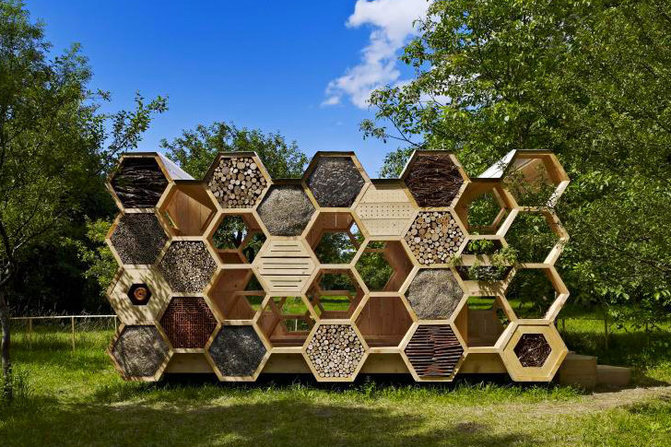Given all the talk about the bad honey that gets imported and the fact that bee populations are dying all over the world this is a great innitiative.
Inner-City B&B BeeHotels
Build safe spaces for native bees refuge and food.
Project details
Suggested by: Artemis
Project partner: City of Melbourne Council
Region
Budget
Votes
297 votes received
This project did not receive enough votes to be successful.
Spread the word

Before participating in Pick My Project please log in or register to YourSAy.
Bees are probably the most important crop pollinators. Native bees pollinate plants that honey bees cannot, like tomatoes. Many native bee species are in decline in great numbers, largely due to loss of feeding and nesting habitats. A problem especially prevalent in urban areas like Southbank.
Solution: Build 3 Bee Hotels in key locations (+ plant native flowers) to help shelter, feed, and boost suffering bee populations. They'll also provide a wonderful focal point to observe unknown activities of bees and educate kids and the wider community on the importance of bees in our ecosystem and how to help them.
It creates an inner-city haven for bees. Especially endangered native species which prefer to live alone. A sustainable eco-system for healthier bees and inner-city plant pollination, complementing CoM's Nature in the City Strategy. An opportunity to learn more about bee behaviours.
The community benefits by strengthening our ecosystem. Six kid-friendly onsite workshops will teach the community the importance of bees and how to build a smaller beehotel for home, plus involve them in assembling the main beehotel. Even though Southbank is known for its shortstay hotels, we want to create a longstay hotel for bees to rest, feed, and thrive.
Project details
Suggested by: Artemis
Project partner: City of Melbourne Council
Region
Budget
Votes
297 votes received
This project did not receive enough votes to be successful.
Spread the word

Before participating in Pick My Project please log in or register to YourSAy.
Comments
Comments closed
This would be a wonderful addition to our community.
Thank you, Nixmann. We hope so too.
It appears you have absolutely no idea what you're talking about. There are no endangered bees in the city of Melbourne. Native bees are not polinators of tomatoes - who told you that? Most native bees nest in the ground so your hotels do nothing for them. It would be great if you got a clue and didn't waste grant money on this when you have absolutely no idea what you're doing.
Hi Sarah. Thank you for expressing your concerns and your vigilance on making sure that state funds are appropriately distributed. We've actually done a lot of research on native bees and been working closely with the City of Melbourne Ecology Team and Park Rangers on this proposal, who are already experienced in installing bee hotels, so that we make sure they cater to bees' needs. This proposal was submitted with those needs in mind and is in line with CoM's "Nature in the City" Strategy (https://www.melbourne.vic.gov.au/sitecollectiondocuments/nature-in-the-city-strategy-summary.pdf). Indeed 75% of native bees species nest on or near the ground. Which is why the bee hotels, which will be designed with input from CoM's Ecology Team, will use a variety of materials and heights, to allow for CoM's Park Rangers to observe and learn more about their natural behaviours and how to cater to these species. Especially species which are threatened or endangered in our urban areas due to urbanisation.
Interestingly, there are native bee species, like the native Blue-Banded bees, that pollinate horticulture plants including tomatoes. See more from the experts here: http://mrccc.org.au/wp-content/uploads/2014/02/Attract-Bees.pdf and here: http://www.abc.net.au/news/2016-02-11/hotel-attracts-native-bees-to-botanic-gardens-canberra/7159688.
As you can appreciate, there is indeed lots of misinformation about our lovely native bee species, which is something we are keen to address with the educational workshops proposed as part of this project, for people to understand and appreciate the important role of bees in our ecosystem.
With your concerns addressed and your passion for native bees, I hope you will vote for this project, or at least join one of the free educational workshops to learn more about them, once the project receives funding. Any other concerns or questions, feel free to contact me directly at: artemis.pattichi@gmail.com, or southbanksustainability@gmail.com.



CarpeLibrum
16 Sep 2018
What a fantastic project, this definitely has my vote.